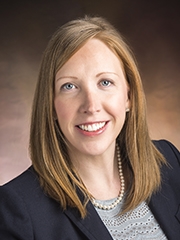Why Early Referral to a Lung Transplant Program Benefits Cystic Fibrosis Patients
Published on
Published on
Dear colleagues,
For patients with cystic fibrosis who might be candidates for a lung transplant, timing is critical. There is an optimal “window” for performing a transplant, when the patient is not so well that their life might be shortened by a transplant, and not so sick that recovery from transplant will be difficult. A pulmonologist or pediatrician who has been caring for a cystic fibrosis patient for several years or since birth, and who is therefore very close to the case, might experience uncertainty as to when this window begins opening.
 Maureen B. Josephson, DO
As Medical Director of Children's Hospital of Philadelphia’s (CHOP) Lung Transplant Program, I strongly encourage an early referral to our program if lung transplant could be in your cystic fibrosis patient’s future. An early referral is the most beneficial path for the patient. When our lung transplant team can meet a patient early, we can perform a full assessment and provide many resources.
Maureen B. Josephson, DO
As Medical Director of Children's Hospital of Philadelphia’s (CHOP) Lung Transplant Program, I strongly encourage an early referral to our program if lung transplant could be in your cystic fibrosis patient’s future. An early referral is the most beneficial path for the patient. When our lung transplant team can meet a patient early, we can perform a full assessment and provide many resources.
If a patient is not yet a candidate for lung transplant — for example, if their FEV1 is consistently less than 50% but not yet rapidly declining — CHOP’s transplant team can still offer recommendations for what the patient and provider can do while waiting. These recommendations can potentially help the patient stay well longer and postpone the “transplant window” even further into the future.
Our lung transplant team can also advise whether there are existing contraindications for transplant. Absolute contraindications include active malignancy, sepsis, active tuberculosis, severe neuromuscular disease, documented refractory non-adherence, multiple organ dysfunction, hepatitis C with histologic liver disease, and CF patients colonized with Burkholderia cepacia complex. However, there remain many “relative” contraindications that should be considered and mitigated promptly if possible.
Most importantly, an early referral allows our lung transplant team to develop a relationship with a transplant candidate and their family and build trust. For patients and family at every stage, we can educate them on what the transplant process entails and other possible ways to manage their cystic fibrosis while waiting. This learning can create reassurance and guidance if and when the time comes to make the decision about transplant.
Maureen Josephson, DO
Medical Director, Lung Transplant Program